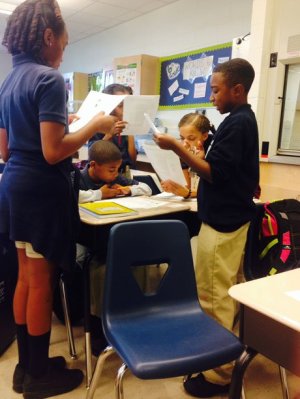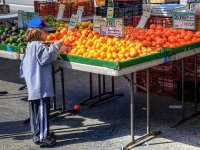Talking Shop: Food Justice Lessons and a Student-Run Grocery Store
All my teaching qualifications derive from my experience as an overweight and underprivileged youth who transformed his life after becoming a contestant on a successful reality weight loss show (yes, that one). My background is not in education. No, my background is in pepperoni and black olive pizza. This is the story of an afterschool program that I started for fifth and sixth graders at Akili Academy in New Orleans. The program is called Akili's Makin' Groceries. Being the fattest kid in class qualifies me to help students make connections between foods that are healthy vs. foods that are not. I learned the hard way.
How Far Away is Your Supermarket?
My interdisciplinary, social justice, nutrition-oriented, community-centered, afterschool program began the moment I asked the students enrolled in Akili’s Makin’ Groceries (named after a regional phrase for grocery shopping) to respond to four questions:
- What neighborhood do you live in?
- Where does your family shop for groceries?
- How long does it take to drive there?
- How far away is the closest corner store?
The responses were predictable. A boy wrote about how his family has to travel across parish lines to get to the grocery store. Another describes having to ride multiple buses in order to access fresh food. These fifth and sixth graders, without realizing it, articulated what it means to live in an urban "food desert," a term that entered their lexicon as they learned from observing Google Maps that three times as many supermarkets are located in New Orleans' predominantly affluent neighborhoods than in communities where residents live near or below the poverty line.
As if not living close to a supermarket wasn't enough of an obstacle, my kids' low-income households are dependent upon public transportation or shared vehicles. The few families who do own a car are prevented from regular travel because of high gas prices. They are limited to making one or two big shopping trips a month, thus increasing their dependence on packaged foods. These families commonly supplement supermarket purchases with the fried, processed and nutrition-poor foods that dominate corner stores in their neighborhood. The sparse selection of fresh fruit and vegetables in these neighborhood stores is priced two to three times higher than at the supermarket.
Food Justice in the Food Desert
Students in Makin’ Groceries have gathered twice a week to unpack the perils of finding fresh food in their city. In the first two months, many realized for the first time that not all food is created equal -- not when you compare the nutritional foods readily available in affluent communities with those in the food desert.
And they learn a lot more: the difference between markets and corner stores; health risks and choices; and what happens when predominantly underprivileged black neighborhoods contain stores with few good options, but abundant alcohol, tobacco and processed food.
These conversations can get heavy, but they're needed. Food justice and activism are themes that I have intentionally incorporated into the curriculum, but we spend most of the time developing a greater appreciation for the positive effects that better food access would have on our bodies, our communities and our national health.
If You Build It, They Will Come
In the next weeks and months, students will survey families and communities to grasp specific neighborhood needs. The students will develop a marketing plan to promote food access. The survey work and marketing will culminate with students opening and managing their very own grocery store, conveniently located within the school. By incorporating food cooperative principles, bulk purchasing methods, and accepting multiple forms of payment including EBT/food stamps, our community will have access to quality food regardless of where supermarkets are located. Additionally, Makin’ Groceries will provide nutrition education on items featured in the weekly shopping box, disseminate recipes, and educate the community about which healthy food combinations can be purchased on fixed incomes.

Figuring It Out as I Go
Our country's inattention to personal health and food choices risks the livelihood and survival of future generations. My approach to helping students draw these conclusions still feels like happenstance -- like I'm making it up as I go. But further delay by waiting to feel 100 percent prepared is not an option.
My students' and their family's health isn't my responsibility. Taking responsibility for personal health is a choice -- like most personal decisions, health cannot be forced. My responsibility is being here, sharing my story, sharing my heart and lending a hand.
